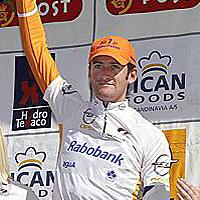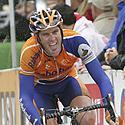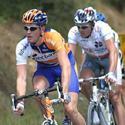
Recently on Cyclingnews.com |
An interview with Rory Sutherland, December 27, 2006
Keeping the fire burning
"I'm amazingly frustrated, but then again, I've never been so calm before in all my life." With his suspension now over and due to make his return to professional racing in less than a fortnight, what's kept the fire in Rory Sutherland's belly burning bright all those months, wonders Anthony Tan?

|
It's a defensive-sounding voice on the other end of the phone. He professes to be an athlete "tainted good". He never approached anyone for a new contract because he didn't want to grovel. When asked about Operación Puerto, he remarks that "it's pretty obvious there's something not right" with the way the sport's currently governed. He says he's incredibly frustrated, also admitting there's a good dose of anger to go along with it.
The last year and a half have largely been a journey of introspection, it seems, for this 23 year-old Australian who hails from his country's capital. Testing positive for a little-known substance he vehemently claims no knowledge of prior to the August test result at the Deutschland Tour (Tour of Germany), Rory Sutherland nevertheless chose not to appeal his 15-month sentence.
"In my situation, I guess it was just easier to bite the bullet, accept what happened, and move towards thinking about next year," he says. "I don't think anything would change the suspension anyway."
"I still do love cycling. I'm pissed off at what's happened, how I've been treated and how the system seems to work sometimes."- In a small way, Rory Sutherland says he's happy that he has changed. But he's still not ready to forget about the past. |
Money wasn't the main reason why he chose the route of acceptance rather than appeal. German cyclist and former Gerolsteiner rider Danilo Hondo, who tested positive for the drug Carphedon in March 2005, lost his appeal before the sport's highest authority, the Court of Arbitration for Sport (CAS), in January this year - but not only did the CAS uphold the decision made by the national cycling federation, they extended the ban by another year.
For a rider in his early thirties, as in Hondo's case, a two or four year ban could result in early retirement. But for a twenty-something neo-pro with little to show for himself, it could easily mean the same thing.
During his time away from racing, Sutherland continued to train "a reasonable amount", but also began working two jobs to keep his frustration at bay. It worked most of the time: "It's very hard to keep yourself motivated when the goals are so far away - you have two good weeks of training and then you have a week where your head falls off a bit. And you just have to find a way to get that edge back, to get that motivation back.
"The process of being suspended is a very scary thing," he admits, "and it's quite possibly a career-stopping and life changing thing - but why let that change me for the worse?"
Sutherland relied heavily on his family and friends back home in Canberra. He also kept up talks with Rabobank, the team that ultimately fired him but where he spent three years as an amateur and one as a professional, and continued to receive coaching from one of their trainers whom he befriended. As part of a mid-year holiday, he'd organised a meeting with management of Holland's number one cycling team, still believing re-entering the ProTour was a probability, and possibly with Rabobank. That was before Operación Puerto made its doping debut at the Tour de France.
"Before the Tour, yes, I thought it was a possibility, because all the reactions I've had from friends or fellow athletes or professionals or directors... It's not like I'd gone away and hidden for the last 15 months. I talked to people all year, I had something in mind about next year for the entire time because you have to keep thinking about it."
The talks with Rabobank eventuated, but did not result in the desired outcome, even though Sutherland says the meeting was more about a friendship than a contract per se. Nonetheless, he speaks of his trip in a mostly positive light.

|
"There was never a hundred percent surety on anything," he says. "I've never had a problem with them, I've talked to them the entire year, but before the Tour, the question never really came up because it wasn't the time to talk about it - it was too far off.
"The Tour especially didn't help and especially the feeling withing cycling at the moment, it's not a fantastic one for people who are 'tainted good', so to speak. Physically, I think [returning to the ProTour] was possible; mentally, it probably would be a bit of a struggle, and it was probably a good time it happened around the Tour, because you had time to accept the fact and start looking at different options."
In his situation, without a team and without a contract, it was important to return home and start reviewing those options. Sutherland says there was interest in Europe and from America, but repeats nothing was a certainty - "there was a lot of talk". Though interestingly, and rather curiously, he maintains he let the teams come to him.
"I, for the record, never approached anyone," he states with a hint of arrogance. "I've only been approached."
"I think it would be pretty difficult by myself to have to approach people and kind of grovel, to a certain extent," laughs Sutherland half-heartedly, "to get yourself back in there. And I guess the road I've chosen is an easier one, but I'm happy with the choices I've made and I've chosen what I considered to be the best option on the table at that time."
Asked if there was a feeling of wanting some time out of the European peloton, the tall, lanky Canberra boy denies having any mental difficulty with such a choice or how he may have been treated upon his return - it was ostensibly a product of circumstance. Rather, it appears more of a struggle that he won't be living there next year.
"It had never really crossed my mind until there was an offer on the table or until there was interest from the US. "I don't have any problems in going to Europe, but this has changed me, and it's not just a job anymore," confesses Sutherland.
"As much fun as I had in Europe and as much as it was my life, there's so many wonderful and beautiful things in the world and things that I enjoy doing, that maybe I'm not really prepared to sacrifice [it all] for cycling after what's happened."
The aim, he tells me - and it's clear from his last words - is that he doesn't only need to learn how to race again, but must learn to love cycling once more.
"My aim for next year is to race again and enjoy myself, and see where I'm at as well," he says of the one-year deal with Pro Continental outfit Health Net/Maxxis, one of America's top squads. "For everyone I've talked to at Health Net and who've ridden against them, it seems like a really great group of people. I'm actually just really interested in working with them and forming new friendships like I had at Rabobank - meeting new people, seeing new things, new experiences... and looking at things at the end of the year."
For a man who seems to live by American Ben Franklin's famous adage, "Nothing is certain but death and taxes", a 12-month contract should suit him well, offering few guarantees. Emphatically saying he doesn't care what people think of him anymore or whatever's written in the press, Sutherland demands he's here only to prove something to himself. Yet, if one is to excel in this most demanding of sports and enjoy a long career, proof comes in the form of results.

|
At the time of our interview, a few weeks before Christmas, Sutherland was yet to receive his race program nor knew where he would base himself in the US, but did mention the team plans to mix racing in the States with a spell of racing in Europe. "There's a lot of racing on the East Coast at the start of the year, so it would possibly be a good idea to stay around there," he says of an intended location in which to live in.
"You've also got to have a good group of people surrounding you, and for me, that's the most important thing - you've got good training partners, you have a society you can easily get into and enjoy yourself in and easy access to airports and things like that. But I guess with the racing as it is in the States, I might not need a real base; there is the possibility of a little bit of to and froing between Australia [and the US] and a couple of blocks of racing in Europe at the same time."
Reflecting on his current state of mind, he says: "At the moment, I still do love cycling. I'm pissed off at what's happened, how I've been treated and how the system seems to work sometimes."
Given the almost farcical turnaround of events surrounding Operación Puerto of late, with all riders - including some, like Spaniard Francisco Mancebo, who admitted he was far from innocent - free to return to racing for the time being, can Sutherland understand the growing cyncism attached to the sport?
"Umm, I do, but I think a lot of it is actually... I think WADA and the UCI - the UCI especially - I'm 99 percent certain their aim is not to taint the name or the sport, but it's pretty obvious to see there's something not right here."
Analysing his own situation, he then seems to contradict himself: "I can't really have a go at the UCI or WADA or anything because that's what was on paper; that's the contract you sign when you apply for a licence, they're the rules. It's not like they broke any; I was the one that had to answer [the question] because that's what the rules were at that stage.
"That's not saying that I don't hope or think that there needs to be serious changes made to all of them, but yeah, there's something not working there. And it's not about pointing the finger and saying that everyone does this and whatever."
According to Sutherland, if his case were before a court of law, he would be in a lot better position than he is now, believing the way he was treated "doesn't seem very humane". Despite what has happened and how he feels, he's ironically quite happy. "As much as I didn't want to it to happen, the things that I've achieved in this last year, the things that I've learned, I'm very happy that I've also had the opportunity to do that, and have had my eyes opened from sport and cycling," he says.
December 16 marked the end date of his suspension. Now, he has structure, a program and a plan in place that if he doesn't follow, will see him fall short upon his return to racing at the Australian national road championships, which begin on January 11 next year. In 2004, on the same course, he became under-23 national champion.
That none of his friends or family doubted or deserted him certainly helps, and in many ways, is testament to his character. Sutherland isn't like many cyclists I've interviewed before; he's well spoken, articulate, perhaps a little over-confident and rather defensive, but nevertheless, intelligent. Intelligent enough to know the difference between right and wrong, and for the time being, intelligent enough to give him the benefit of the doubt.
"That's why it is so humbling and you still do believe in yourself. As much as I'd like to be, it's not my aim to be the nicest person in the world, but to get a good feeling that you've done something right, somewhere along the lines," he says, a muffled laugh following.
"I'm amazingly frustrated," he adds, "but then again, in the last few months, I've never been so calm before in all my life."
Editor's note: Rory Sutherland will be writing an exclusive diary for Cyclingnews in 2007.
